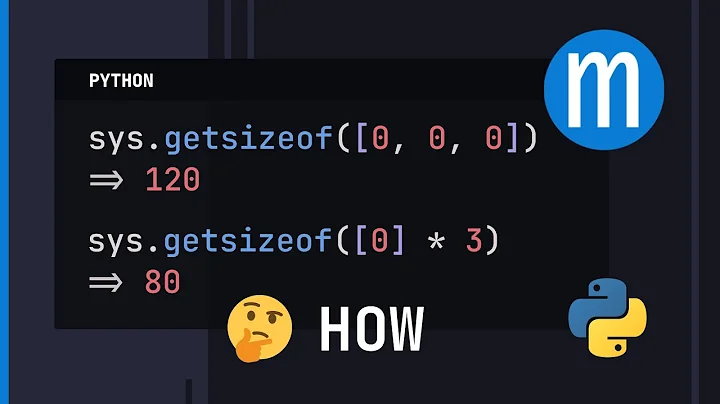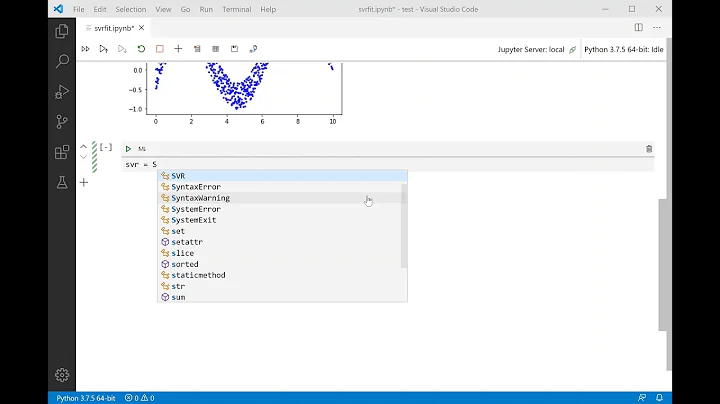std::vector to boost::python::list
Solution 1
I have this function using iterators to convert std::vector to py::list:
namespace py = boost::python;
template<class T>
py::list std_vector_to_py_list(const std::vector<T>& v)
{
py::object get_iter = py::iterator<std::vector<T> >();
py::object iter = get_iter(v);
py::list l(iter);
return l;
}
Solution 2
boost::python already includes functionality for wrapping vectors and maps. Here's sample code for vectors, as you can see both passing and returning lists is quite simple:
// C++ code
typedef std::vector<std::string> MyList;
class MyClass {
MyList myFuncGet();
void myFuncSet(const Mylist& list);
// stuff
};
// Wrapper code
#include <boost/python/suite/indexing/vector_indexing_suite.hpp>
using namespace boost::python;
BOOST_PYTHON_MODULE(mymodule)
{
class_<MyList>("MyList")
.def(vector_indexing_suite<MyList>() );
class_<MyClass>("MyClass")
.def("myFuncGet", &MyClass::myFuncGet)
.def("myFuncSet", &MyClass::myFuncSet)
;
}
Maps are very similar to vectors and are described in this post: Boost::Python- possible to automatically convert from dict --> std::map?
Unfortunately boost::python does not currently include facilities for wrapping lists. You can create the wrapper manually, but I'm out of time for this answer. I can post it today or tomorrow. I'd appreciate a new question about this particular problem, because the answer will be quite extensive and is probably outside of the scope of this post. I'd just avoid lists and use vectors instead.
Solution 3
If you only want to create python list manually (and have the function return py::list rather than vector), do it like this:
/* using namespace std; namespace py=boost::python;
#define FOREACH BOOST_FOREACH
*/
vector<string> ss;
py::list ret;
FOREACH(const string& s, ss) ret.append(s);
return s;
For automatic conversions, define the converter for vector from python list to c++ and from c++ to python list -- I just wrote about that at Instantiating shared_ptr's in boost::python (the second part of the reply); that way, you get realy python lists.
Another possibility for automatic conversion (which I have no experience with) is to use indexing_suite, which will wrap vector<string> as a special class in python, as a colleague mentioned here already.
Solution 4
From http://gist.github.com/octavifs/5362272:
// Converts a C++ vector to a python list
template <class T>
boost::python::list toPythonList(std::vector<T> vector) {
typename std::vector<T>::iterator iter;
boost::python::list list;
for (iter = vector.begin(); iter != vector.end(); ++iter) {
list.append(*iter);
}
return list;
}
Solution 5
FWIW, here's a templated function in the same vein as eudoxos' solution:
namespace py = boost::python;
template<class T>
py::list std_vector_to_py_list(const std::vector<T>& v)
{
py::list l;
typename std::vector<T>::const_iterator it;
for (it = v.begin(); it != v.end(); ++it)
l.append(*it);
return l;
}
Related videos on Youtube
mcot
Updated on July 09, 2022Comments
-
mcot almost 2 years
I have a method in c++ that gets called from python and needs to return a python list object.
I have already created the method, and its attached to an exposed class and callable from python right now... (it returns void).
So the question is, how do I create a python list from this:
std::vector<std::string> results;I am not really understanding how the constructor works from this documentation:
http://www.boost.org/doc/libs/1_37_0/libs/python/doc/v2/list.html
Also... I don't really want to return kind of wrapped vector... I just want to create a new python list with the string values from the vector.
My apologies if this is a duplicate... I found quite a few list to vector questions but I couldn't find any about creating a new python list.
I could expand this question to include some other questions like:
Creating a new python dictionary from a:
std::map<std::string, std::string>and so on.-
mcot almost 13 yearsI saw this question: stackoverflow.com/questions/3240971/… But that was talking about returning a wrapped vector... I just want to create a new python object and return that.
-
inspectorG4dget about 7 yearsPossible duplicate: stackoverflow.com/q/5314319/198633
-
-
Robert Parcus almost 13 yearshello @Aleksey, I think I have a related question for you link
-
Dan Niero almost 12 yearsdoesn't have this a massive overhead? It is really a question
-
Andrew Marshall over 11 yearsI tried this, I get an exception on
py::object iter = get_iter(v):No to_python (by-value) converter found for C++ type: class std::vector<int,class std::allocator<int> >as of Boost 1.51 -
 Rob Agar over 10 yearslikewise 'No to_python (by-value) converter found for C++ type: std::vector<std::string, std::allocator<std::string> >', boost 1.48
Rob Agar over 10 yearslikewise 'No to_python (by-value) converter found for C++ type: std::vector<std::string, std::allocator<std::string> >', boost 1.48 -
SullX over 10 yearsSame error as well, <type 'exceptions.TypeError'>: No to_python (by-value) converter found for C++ type: std::vector<double, std::allocator<double> >
-
GaryO about 10 yearsThis copies the values as it appends to the list, right? Is there any way to avoid that (assuming the values are of some class type), so in python
get_list(0) == get_list(0)returns true? Something likebp::reference_existing_objectbut within the function? -
Marcin over 8 yearsThe same error here:
No to_python (by-value) converter found for C++ type: std::vector<int, std::allocator<int> > -
user819893 about 6 yearsYes, it works, but I'm not sure if there is too much overhead by having to iterate the vector and append each element. Maybe using a numpy array is more efficient?
-
 GoingMyWay over 5 yearsThank you, by the way, does this method has a large overhead? Sorry, I am a newbie in C++ and boost.python.
GoingMyWay over 5 yearsThank you, by the way, does this method has a large overhead? Sorry, I am a newbie in C++ and boost.python. -
 GoingMyWay over 5 yearsAnd can you share the link of the corresponding docs of
GoingMyWay over 5 yearsAnd can you share the link of the corresponding docs ofvector_indexing_suite. -
Aleksey Vitebskiy over 5 yearsAll
vector_indexing_suitedoes is create a python wrapper forstd::vector. This means that thestd::vectoris accessed directly. It's basically the lowest overhead you can hope for. Here's the link: boost.org/doc/libs/1_68_0/libs/python/doc/html/reference/topics/…. -
Hendrik Wiese about 5 yearsSame error here with Boost 1.58. Any idea how to solve this?










